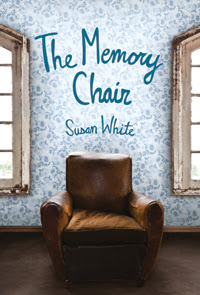 After I sighed enviously through Susan White’s Ten Thousand Truths and longed to live on a magical farm like that (despite the fact that there’s nothing magical about having to dig and drudge and deal with small, mad chickens who don’t want you to take their eggs), I was pleased to find another book which I can only describe as magical realism. Is it fantasy? Not really. Is it speculative? Kind of. Magical is just the best way to describe it, and it’s a marvelous book to take you through an extra-long lunchtime spent munching the first tiny, sour plums of summertime.
After I sighed enviously through Susan White’s Ten Thousand Truths and longed to live on a magical farm like that (despite the fact that there’s nothing magical about having to dig and drudge and deal with small, mad chickens who don’t want you to take their eggs), I was pleased to find another book which I can only describe as magical realism. Is it fantasy? Not really. Is it speculative? Kind of. Magical is just the best way to describe it, and it’s a marvelous book to take you through an extra-long lunchtime spent munching the first tiny, sour plums of summertime.
Summary: Betony Fraser wishes she could blow off her mother as easily as her two brothers do, but no, she got the guilt gene, and she dutifully drags along behind her mother on the weekly after school visit to see Gram, Betony’s Mom’s-grandmother. Betony is not good with Really Ancient; Grammie and Grampie, her grandparents, are only “older,” and they’re amazing, but Betony was mostly terrified of her speechless great-grandfather, who she only knew briefly while he was in the nursing home, and she’s never even so much as touched Gram, preferring to kind of stay behind her mother as often as possible or escape down to the beach in front of Gram’s house instead of doing chores inside. Gram is ninety-two, and though she be but little, she is fierce — still strong enough to weed the garden, get the wood from the basement, keep the wood stove roaring (in her way-too-hot house), clean the house, and put a from-scratch dinner on the table every night. But while Gram is strong in body, she is additionally inflexible in mind, cranky and abrupt, full harsh criticism and stinging observations about how today is never as good as back when she was a girl. Betony’s mother is full of warnings and threats toward she and her brothers, before they go to visit, which makes Betony and her siblings really appreciate Gram even less. Plus, Betony thinks her house smells weird.
On the late Spring afternoon that Betony falls into an after-school doze in her grandmother’s chair — and time-slips into the turn of the last century and her great-grandmother’s childhood, things change. Betony dreams faces she’s never been showed pictures of, experiences stories she’s never been told — and gains an abrupt and shocking insight into her great-grandmother’s life. Betony wants to know more, begins to spend more time with Gran, digging into old family albums and hearing more stories. She’s amazed at how hard Gran worked as a girl her age – and she started sewing when she was seven?! Betony realizes that she, too, can do more, and becomes interested in learning to piece quilts. As long as she keeps sitting in her grandmother’s chair, she gains snippets of the past which connect her to something much bigger than herself — her history. But, the chair is giving her a history of things that don’t seem to be accurate in the present. Something happened to her family as it once was — something Betony can’t quite see. Even the most innocent of discoveries in the spare room closet send Gram into rage, but Betony can’t stop. Is seeing into the past really worth digging up pain and trouble and a secret family shame in the present?

Peaks: Betony’s discomfort with the elderly was written so accurately that I had to smile. I remember doing a lot of visiting with the elderly, at the leadership if my mother, and I could think of twenty-seven million other places I wanted to be, other than with steel-haired women telling me I should sit up straighter, and couldn’t I speak up? I empathized with her resentment of her siblings, who somehow were always elsewhere, when visits came up.
I appreciated the gradual unfolding of the tale, which took me at its own, unhurried pace, then smacked me with a curveball I NEVER saw coming. It was so unexpected that I said, “Huh!” out loud when I was reading. I further appreciated the denouement took time as well; there was going to be no insta-happy HEA with the ending. Just adding water – either under the bridge or in smaller drops, as tears of joy – was fifty-three years too late.
In a way, I also appreciated that the mystery of the chair is never explained – or even fully shared. When Betony eventually ceases to rely on it for her link to the past, she makes a point that the present is what must be dealt with – which makes a lot of sense. But, I do wonder if it still works, or if it ever channels another family member’s memories…
Valleys: Readers recommending this book to middle grade readers may find that because of its writing style that adults may enjoy it just as much, or more than younger readers. While we see through Betony’s eyes and hear her voice, there’s a bit of a disconnect from the character, and the other characters in the book, especially her brothers, occasionally come off as somewhat stereotypical blurs of testosterone and noisy activity.
Without revealing spoilers, there is indeed a very terrible thing Betony discovers, and I wish the narrative had slowed down to really explore how Betony felt about the actions taken, her own beliefs, her own beliefs within the context of her day-to-day experiences and school friends, and exploring her own true feelings in the face of that. I found myself wondering why she took the action she did – it seemed reflexive, but I would have liked to see her think about it, and weigh what she believed. A lot of the issue was dismissed relative to the time (“people didn’t know any better”), and only one character of Betony’s generation seems to be left with resentment and confusion – with no target, and no outlet. While not demanding that heavy and negative emotions need to be overemphasized at the expense of the plot, I believe we underestimate kids’ emotional intelligence and ability to process beliefs and judgements, by glossing over a shameful behavior.
Conclusion: This is a really excellent book which digs into the past – Canada’s past – and shines some light on beliefs and assumptions which many people hold about how “decent” of people they are. I loved it, and am grateful for the recommendation. Readers looking to spur important conversations about prejudices and family will find plenty to chew over in this slim volume.
I received my copy of this book courtesy of Emily at Nimbus Press. You can find THE MEMORY CHAIR by Susan White at an online e-tailer, or at a real life, independent bookstore near you!